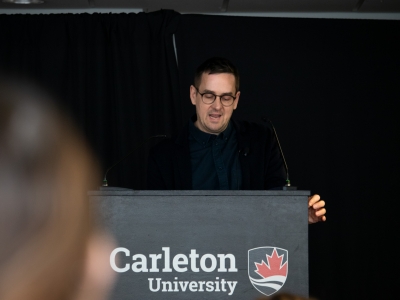“There is a need for education that bridges the two worlds.”
– Frances Abele

If you ask Dr. Frances Abele about cooperative ventures between academia and Indigenous people, she will tell you that we’re at a tipping point, at the beginning of an important wave of Indigenous scholarship in Canada that will change universities. It’s a change that Frances Abele welcomes.
For 30 years, Abele has been a leader in collaborative research with Indigenous communities and organizations. She is an internationally recognized authority on northern political and economic development and on evolving relations between Aboriginal peoples and nations and Canadian public policy institutions.
Over her distinguished career, Dr. Abele has secured six SSHRC grants as principal applicant and participated in another six SSHRC projects as co-applicant, raising nearly $2 million in research grants, contracts, and project funding. She’s also assisted universities in creating educational opportunities for and with Indigenous scholars.
“Blessed with wonderful graduate students”

For these accomplishments, Abele has been awarded the Carleton University Research Prize for Research and Academic Impact. The prize recognizes a researcher whose teaching, research and administrative skills have played “a notable role in building on institutional strengths and connections to make a difference for Carleton’s leadership as a comprehensive university”.
Her notable career accomplishments include receiving a Queen’s Jubilee Medal for her leadership in building northern studies in Canada and her work as deputy director of research at the Royal Commission on Aboriginal Peoples, where she was responsible for research and analysis on the North.
“There is no scholar who better embodies Carleton University’s commitment to innovative, community-engaged research, meaningful co-creation of knowledge with Aboriginal peoples, and international leadership,” wrote Dean Andre Plourde of the Faculty of Public Affairs, in his nomination letter.
Currently, Abele is leading the creation of a new Indigenous Policy and Administration program at the School of Public Policy and Administration. She draws, in part, on her extensive experience developing a program to provide public administration education to the newly formed Government of Nunavut in the early 2000s. She finds the demand for such programs is growing.
“As more Indigenous peoples build self-governing institutions, and as other third sector Indigenous organizations continue to grow in size and scope, there is a need for education that bridges the two worlds,” explains Abele. “We will be working with public administrators who want to place their on-the-job learning in a more academic context, and with people who have less experience who are looking for educational preparation for this work.”
However, Abele says there are challenges. One is to make graduate education accessible to students who, for reasons of work or family responsibilities, may not be able to relocate to Ottawa for a long period of graduate study. To address that concern, the Indigenous Policy and Administration program will be offered almost entirely on-line, beginning with a two-week intensive residency.
Secondly, educators need a diverse curriculum that reflects and responds to the unique circumstances of each First Nation, Metis and Inuit community and organization everywhere in Canada.
In order to prepare for this, Abele and her colleagues in the School of Public Policy and Administration are working with a number of Indigenous and other experts who are knowledgeable about Indigenous pedagogies, and the range of circumstances that future leaders and managers will encounter.
In addition to her own work, Abele notes that she is “blessed with wonderful graduate students” who are conducting their own research programs in this field. “They are full of energy, idealism and initiative,” she says.
In fact, three senior doctoral students have created northern Canada’s first policy magazine, Northern Public Affairs, which Abele takes no credit for, but of which she is clearly proud.
Ultimately, Abele’s hope is that education in public policy and administration will contribute to the reversal of some of the injustices experienced by the First Nations people.
“There are great structural inequalities that maintain poverty and injustice in this country,” explains Abele. “I want universities to be part of the solution in changing that.”
Monday, November 17, 2014 in Groundbreaking Research
Share: Twitter, Facebook



